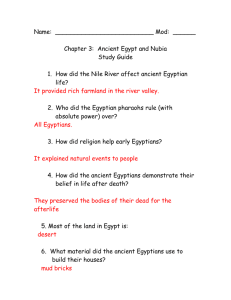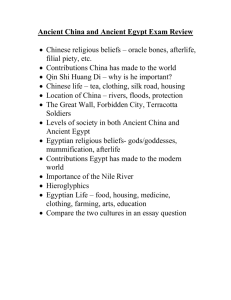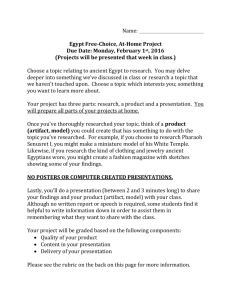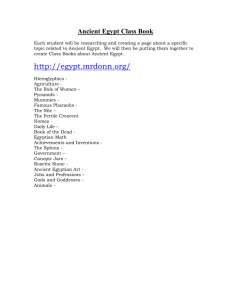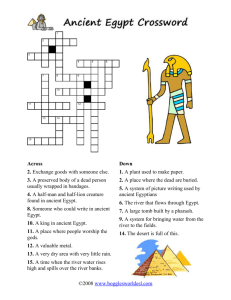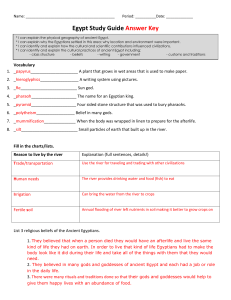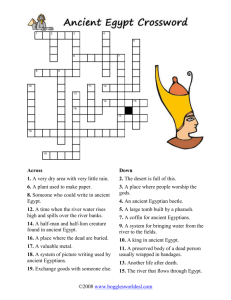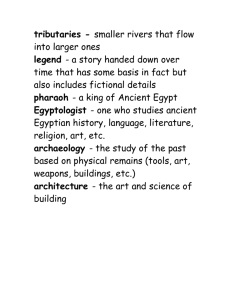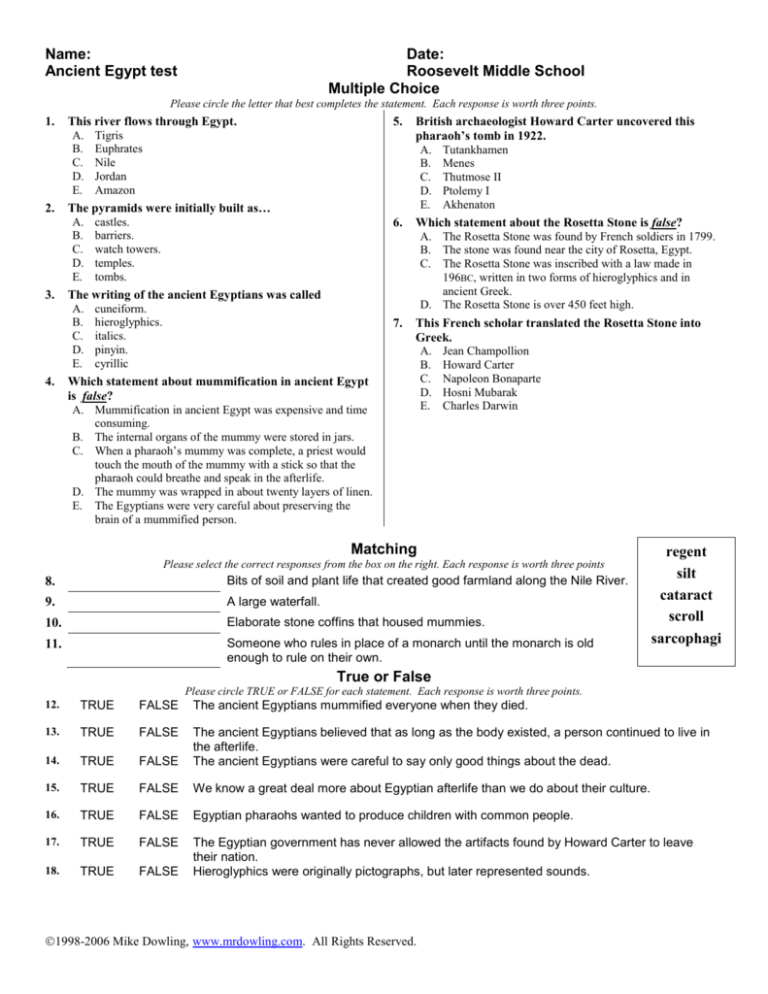
Name:
Ancient Egypt test
Date:
Roosevelt Middle School
Multiple Choice
Please circle the letter that best completes the statement. Each response is worth three points.
1.
2.
3.
4.
This river flows through Egypt.
A. Tigris
B. Euphrates
C. Nile
D. Jordan
E. Amazon
The pyramids were initially built as…
A. castles.
B. barriers.
C. watch towers.
D. temples.
E. tombs.
The writing of the ancient Egyptians was called
A. cuneiform.
B. hieroglyphics.
C. italics.
D. pinyin.
E. cyrillic
Which statement about mummification in ancient Egypt
is false?
A. Mummification in ancient Egypt was expensive and time
consuming.
B. The internal organs of the mummy were stored in jars.
C. When a pharaoh’s mummy was complete, a priest would
touch the mouth of the mummy with a stick so that the
pharaoh could breathe and speak in the afterlife.
D. The mummy was wrapped in about twenty layers of linen.
E. The Egyptians were very careful about preserving the
brain of a mummified person.
5.
6.
7.
British archaeologist Howard Carter uncovered this
pharaoh’s tomb in 1922.
A. Tutankhamen
B. Menes
C. Thutmose II
D. Ptolemy I
E. Akhenaton
Which statement about the Rosetta Stone is false?
A. The Rosetta Stone was found by French soldiers in 1799.
B. The stone was found near the city of Rosetta, Egypt.
C. The Rosetta Stone was inscribed with a law made in
196BC, written in two forms of hieroglyphics and in
ancient Greek.
D. The Rosetta Stone is over 450 feet high.
This French scholar translated the Rosetta Stone into
Greek.
A. Jean Champollion
B. Howard Carter
C. Napoleon Bonaparte
D. Hosni Mubarak
E. Charles Darwin
Matching
Please select the correct responses from the box on the right. Each response is worth three points
8.
Bits of soil and plant life that created good farmland along the Nile River.
9.
A large waterfall.
10.
Elaborate stone coffins that housed mummies.
11.
Someone who rules in place of a monarch until the monarch is old
enough to rule on their own.
regent
silt
cataract
scroll
sarcophagi
True or False
Please circle TRUE or FALSE for each statement. Each response is worth three points.
12.
TRUE
FALSE
The ancient Egyptians mummified everyone when they died.
13.
TRUE
FALSE
14.
TRUE
FALSE
The ancient Egyptians believed that as long as the body existed, a person continued to live in
the afterlife.
The ancient Egyptians were careful to say only good things about the dead.
15.
TRUE
FALSE
We know a great deal more about Egyptian afterlife than we do about their culture.
16.
TRUE
FALSE
Egyptian pharaohs wanted to produce children with common people.
17.
TRUE
FALSE
18.
TRUE
FALSE
The Egyptian government has never allowed the artifacts found by Howard Carter to leave
their nation.
Hieroglyphics were originally pictographs, but later represented sounds.
1998-2006 Mike Dowling, www.mrdowling.com. All Rights Reserved.
Matching
Please select the correct responses from the box on the right. Each response is worth three points
19.
This is the first pharaoh we know about. He united Upper
and Lower Egypt into the “Old Kingdom” about 3100BC.
20.
A woman pharaoh who dressed in men’s clothes.
21.
This monotheistic pharaoh worshipped a sun god. He did
not allow the Egyptian people to worship any other gods.
22.
This boy king became pharaoh when he was nine years old.
Akhenaton
Hatshepsut
Menes
Thutmose II
Tutankhamen
Extended Response
You may write in cursive or manuscript but your work must be very neat. Twelve-point answer will be scored as follows: two points for including a
topic sentence, four points for each valid supporting statement, and two points for including a valid conclusion.
23. Explain why the Greeks called ancient Egypt “the Gift of the Nile.”
24. How was ancient Egypt protected from invaders by natural borders?
Synthesis
You may write in cursive or manuscript, but your work must be very neat. Each question is worth five points and requires you to think for yourself.
Two points are awarded for a serious effort.
25. People in South Florida are fearful of hurricanes and flooding, but the people of ancient Egypt welcomed the
flooding of the Nile. Why are we more fearful of flooding than the ancient Egyptians?
26. What would you take with you to the Egyptian afterlife? Explain why you would take these things.
1998-2006 Mike Dowling, www.mrdowling.com. All Rights Reserved.

